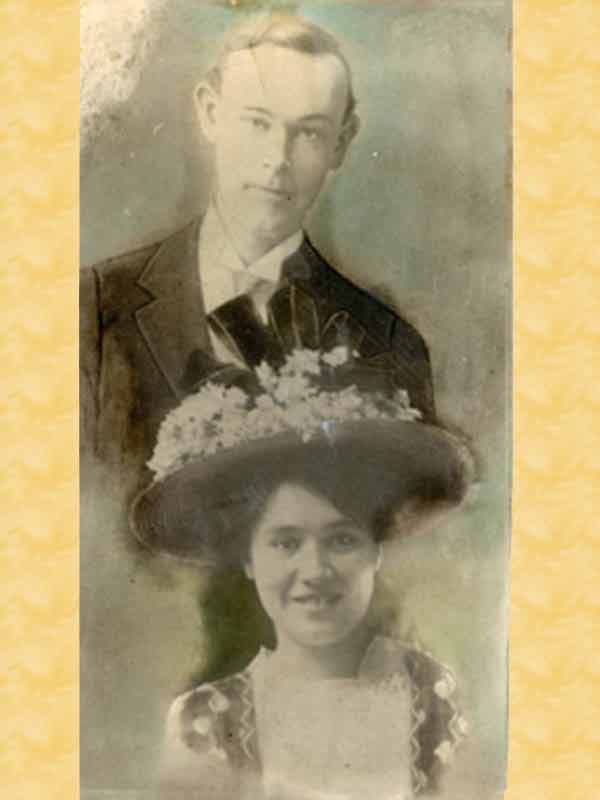A California Family

| Mi madre se nacio en el Paso del Robles, California, mi padre en el Paso del Norte, Texas. Entre estos pasos hay un lugar (o varios lugares), un idea (o varios ideas) que se llama la frontera… the frontier, the boundary, the border. We Californians are a frontier people, dwelling on the edge of cultures and races and nationalities; that is our beauty and our strength. |
When my great-great grandparents, Ricardo Terril and Ramona Botella, migrated north from Mexico in the 1850s they settled at Rancho Tejon, where he was a vaquero. He was mostly Irish; she was mostly Spanish; both were entirely Mexican. In fact, they were for a long while unaware that they had left Mexico… according to family lore.
Another set of my great-great grandparents, John and Belle Martin, came west a decade later from North Carolina and Missouri in the thrall of Manifest Destiny. They farmed near Sacramento, and tales of the slave-holding Martins included acknowledgement of African-American kin.
In a tangle of generations and marriages, Terrils and Martins would encounter Silveiras and Johnsons and Carrs, Sharps and Castillos and Haslams… an ethnic stew that reflected this state's growth and heterogeneity. As the millennium turns, we have cousins with roots in every continent but Antarctica… no penguins.
My immediate family remained culturally more Hispanic than genes or bloodlines might have predicted, because my mom was raised by her maternal grandmother, Esperanza Castillo, who would live with us when I was a little boy and who would as a result much later become the central character in my story "The Horned Toad." My own abuela, Ramona Silveira, was ill for many years and could not care for her children, but once she recovered she became a dominant personality. Her husband was John K. Johnson of Danish-German descent, but his Latina wife's culture ruled their household as certainly as it had once ruled coastal California.
Grandma was mischievous, and she had a lively sense of humor. For instance, she spoke only Spanish when she met her younger daughter's in-laws, who didn't approve of Mexicans. I remember, too, watching a parade in Santa Barbara with her while WASP businessmen and their ladies promenaded by dressed as idealized Spaniards. My abuelita chuckled and she said to me, "I'll bet the only Spanish word they know is 'taco'".
I was instructed by my mother to tell my teachers I was Spanish when nationalities were questioned at school. That response always confounded faculty since I wasn't brown. Mom did that because our family wasn't on the 19th-century list employed then which didn't acknowledge mixing or the role of class.
My Anglo dad never fully understood what he got into when he married Mom, with her strong senses of familia, fe y lengua, but in a fine irony, we eventually learned that Haslam is an Anglicized Sephardic name. Pop's line was related to such eminent South Americans as writer Jorge Luis Borges, bandleader Sergio Mendez, and writer/composer Gene Lees. What a remarkable heritage we people of the Americas share.
I first sensed that as a seventh-grader when I was sent to a Catholic School in Bakersfield. There the first guys to accept me were "chili chokers," consigned by racism to the junior high's lower social rungs. Because they took their own mixed ancestry for granted — "Hey, the Spaniards never even said buenas dias to your grandma, ese!" — I soon realized it was no big deal. Through them, too, I realized then that looks had little to do with being Hispanic… or Indian, in many cases. Through them, too, I learned to insist that my heterogeneity, like my humanity, be respected.
Those old buddies would have cracked up if they had been there the day I began a lecture to Chicano Studies students at U.C. Berkely by saying, "Yo soy sus nietos." The students were baffled: what was this old gabacho talking about? He was talking about whom they were dating and the future of California.
Shortly thereafter, a colleague at Sonoma State saw a story of mine in a collection of Chicano writing, another in an anthology of Native American tales, and yet another presented as an Okie story in a regional collection. He demanded, "Just what are you, anyway?"
I replied, "What makes you think I can't be all three of those things, and more too? You should see my kids; they're like the reatas my bisabuelo used to braid — this and that mingled and pulled tight into a single strong strand. This is California, man. This is America."
| A California Family originally appeared in CATE (CAlifornia Teachers of English) for June/July 1986. |

